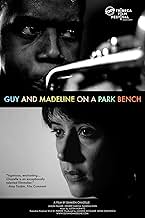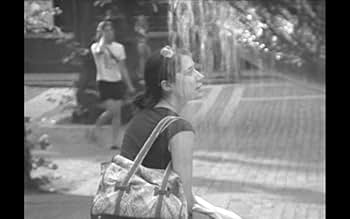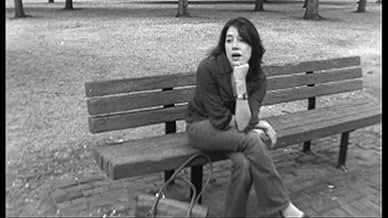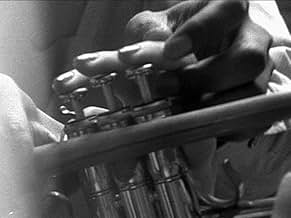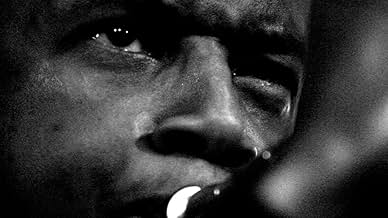After connecting with the shy Madeline, a jazz trumpeter embarks on a quest for a more gregarious paramour, but through a series of twists and turns punctuated by an original score, the two ... Read allAfter connecting with the shy Madeline, a jazz trumpeter embarks on a quest for a more gregarious paramour, but through a series of twists and turns punctuated by an original score, the two lovers seem destined to be together.After connecting with the shy Madeline, a jazz trumpeter embarks on a quest for a more gregarious paramour, but through a series of twists and turns punctuated by an original score, the two lovers seem destined to be together.
- Awards
- 2 wins & 5 nominations total
- Director
- Writer
- All cast & crew
- Production, box office & more at IMDbPro
Featured reviews
Damien Chazelle's first feature length film isn't an easy one to dissect. Filmed like an early John Cassavetes' movie and told with little to no dialogue at all, Guy and Madeline on a Park Bench is much more so an exploration into how difficult it is to maintain love than it is a musical like Chazelle's latest feature, La La Land. But it's Chazelle's grasp on the ups and down's of relationships that make this yet another interesting directorial effort from him. All 3 of his films to this point have involved Jazz, and all 3 of them have also dealt with characters trying to balance their love life with pursuing their Jazz related dreams. 'Guy and Madeline' isn't as intense as Whiplash nor as viscerally memorable as La La Land, but for a first- time feature, it definitely impresses. An occasional dance number, unique camera movement, and long unedited takes make for quite the viewing experience. Again, there's little dialogue, so I can't say I was as invested in the characters as I should have been, but sometimes scenes are more powerful when less is said (see: the final scene). If anything, this was an interesting watch considering all we know about Chazelle's career up to this point.
6.7/10
6.7/10
Damien Chazelle's debut feels somewhere between a Jim Jarmusch indie and an Astaire-Roger musical. Here's a filmmaker with a deep love of the movie musical trying to make it work on a shoestring budget. The musical genre begs for rich production, so Chazelle tries to circumvent it with a nontraditional script; the central relationship is told in undefined fragments and almost exclusively in the less-sexy aftermath of their love. The musical elements are instead used as flourishes - sometimes daydreams, sometimes as breaks from the story. It's a mess, but one with its charms.
Chazelle's directorial strength is in detail shots and closeups that evoke a tenderness and the vulnerability of the characters. The film excels in these little character moments far more than it does in telling a complete story. Despite Chazelle's decision not to build the characters from the ground up, every so often he strikes a deeply familiar chord with just a few well-executed shots that it becomes possible to connect to Guy, Madeline and Elena's emotions.
The centerpiece of the film though is Justin Hurwitz's score, which feels timeless yet not overly cliche and predictable. The quality of the music, including what was presumably Jason Palmer's (Guy) own trumpet playing, puts the score in a class that the movie's visual quality can't keep up with to the point that you might assume Chazelle just purchased or borrowed professional music.
It's always nice to see how a now-esteemed director pulled together a project with minimal resources. Chazelle wanted to tell a love story that married jazz and musicals and he finds a way to do it, even if the finished project is rough around the edges and a little defiant of mainstream tastes.
Chazelle's directorial strength is in detail shots and closeups that evoke a tenderness and the vulnerability of the characters. The film excels in these little character moments far more than it does in telling a complete story. Despite Chazelle's decision not to build the characters from the ground up, every so often he strikes a deeply familiar chord with just a few well-executed shots that it becomes possible to connect to Guy, Madeline and Elena's emotions.
The centerpiece of the film though is Justin Hurwitz's score, which feels timeless yet not overly cliche and predictable. The quality of the music, including what was presumably Jason Palmer's (Guy) own trumpet playing, puts the score in a class that the movie's visual quality can't keep up with to the point that you might assume Chazelle just purchased or borrowed professional music.
It's always nice to see how a now-esteemed director pulled together a project with minimal resources. Chazelle wanted to tell a love story that married jazz and musicals and he finds a way to do it, even if the finished project is rough around the edges and a little defiant of mainstream tastes.
Damien Chazelle's feature film debut may not hold a candle to his subsequent films but it does showcase many of the themes & trademarks that he would go on to refine & perfect in his later works, especially the role of music in driving his narratives and his penchant for talented & ambitious protagonists. Not a memorable start by any means but a start nonetheless. And the creative leaps he's made since this film only speaks of his quick grasp & understanding of the filmmaking medium.
I definitely sought this out because of a particular reason- Damian Chazelle and Whiplash. Whiplash is an amazing film, intense, full of passion, and so I wanted to see his debut. It's a solid debut, if unremarkable and sort of dull at times. It's very natural and there's really nothing that would indicate the strong intensity in Whiplash. The only similarities are really that instruments and music are at the core (just like, also, the film he co-wrote grand Piano). Yeah, I could see many not liking this at all or liking Whiplash, or even, liking this or not Whiplash because both are so different in style so there's no telling which way the passion will go. I recommend it slightly, but it's not totally recommended and not a home run by any means
Who would've thought director Damien Chazelle, following his low-key, festival-success with Guy and Madeline on a Park Bench, would go on to be something of a hot commodity in the film world just five years later with the release of his sophomore effort Whiplash, meriting several Oscar nominations and wins and a whirlwind of positive buzz? To say Guy and Madeline on a Park Bench is a different film from Whiplash is an understatement. While I obviously did not go into this film expecting to see a film similar in style or quality to Whiplash, judging simply by the plot and the poster, I think it's worth noting that I'm not particularly sure both of these films exist in the same universe together. I highly doubt there's anything resembling a Terence Fletcher in the whimsical world of Guy and Madeline.
The film takes place in Boston, centering on the titular characters (Jason Palmer and Desiree Garcia, respectively), who've been dating for about three months. Guy is a jazz trumpeter, obtaining whatever work he can get in jazz clubs or underground subways, just to make end's meet, and Madeline is an introverted soul who can't seem to find any kind of work. The immediate shock of meeting one another and falling in love has faded for both of them, to say the least, as Guy is now pursuing the likes of Elena (Sandha Khin), a more adventurous soul with a more outgoing personality. This leaves Madeline out tremendously, to which she responds by trying to get her own life on track with a new boyfriend whilst Guy continues to play his nightclubs and make a living as a jazz musician.
Guy and Madeline on a Park Bench is like a cross between contemporary mumblecore filmmaking and the classic, Hollywood musicals of the 1950's, which featured enough whimsy and warmth for an entire franchise. Chazelle employs the directorial style of shooting close to the subjects, using extreme close ups or traditional close ups in order to presumably conjure intimacy within its subjects. Combine this with the grainy black and white cinematography and method of shooting and you have a film that's more enjoyable as an exercise in style than anything else. The aforementioned qualities that seem to be extracted from 1950's Hollywood musicals, however, poses a nice change in pace for the mumblecore style, rather than the traditional band of twentysomethings talking and rambling about their existence and their lives in closed, tight-knit settings like lofts and apartments.
It seems whenever the genre of mumblecore - and by "mumblecore," I mean the cinematic subgenre/style of shooting with lower budgets, low-quality cameras, amateur actors, and an emphasis on naturalistic writing and acting, traditionally by way of improvisation - decides to increase its playing field by pursuing genres such as musicals and horror films that they're mostly enjoyable as stylistic exercises and little else. Mumblecore is such a difficult subject to explain, and, more often, recommend, because its ability to be likable starts and ends with the focus it puts on its characters and the qualities of their personalities. If you have a film of the genre with lackluster characters that don't do much else other than lackadaisically converse and don't exchange anything of noteworthy insight or ideas, than you have a film that's fairly stagnant in its likability.
That's more or less what happens with Guy and Madeline on a Park Bench; the actors here are uniformly capable and Chazelle's close ups along with self-executed cinematography make for a film that takes on a new life all its own in terms of look, feel, and mood. However, in the process, there's little to no character or philosophical development for the film's titular characters, leaving them lost in the shuffle while the environment and the film's own atmosphere engulf them entirely. What we have here, again, is another mumblecore film that is much more intriguing to speak about and discuss rather than actually view.
Starring: Jordan Palmer, Desiree Garcia, and Sandha Khin. Directed by: Damien Chazelle.
The film takes place in Boston, centering on the titular characters (Jason Palmer and Desiree Garcia, respectively), who've been dating for about three months. Guy is a jazz trumpeter, obtaining whatever work he can get in jazz clubs or underground subways, just to make end's meet, and Madeline is an introverted soul who can't seem to find any kind of work. The immediate shock of meeting one another and falling in love has faded for both of them, to say the least, as Guy is now pursuing the likes of Elena (Sandha Khin), a more adventurous soul with a more outgoing personality. This leaves Madeline out tremendously, to which she responds by trying to get her own life on track with a new boyfriend whilst Guy continues to play his nightclubs and make a living as a jazz musician.
Guy and Madeline on a Park Bench is like a cross between contemporary mumblecore filmmaking and the classic, Hollywood musicals of the 1950's, which featured enough whimsy and warmth for an entire franchise. Chazelle employs the directorial style of shooting close to the subjects, using extreme close ups or traditional close ups in order to presumably conjure intimacy within its subjects. Combine this with the grainy black and white cinematography and method of shooting and you have a film that's more enjoyable as an exercise in style than anything else. The aforementioned qualities that seem to be extracted from 1950's Hollywood musicals, however, poses a nice change in pace for the mumblecore style, rather than the traditional band of twentysomethings talking and rambling about their existence and their lives in closed, tight-knit settings like lofts and apartments.
It seems whenever the genre of mumblecore - and by "mumblecore," I mean the cinematic subgenre/style of shooting with lower budgets, low-quality cameras, amateur actors, and an emphasis on naturalistic writing and acting, traditionally by way of improvisation - decides to increase its playing field by pursuing genres such as musicals and horror films that they're mostly enjoyable as stylistic exercises and little else. Mumblecore is such a difficult subject to explain, and, more often, recommend, because its ability to be likable starts and ends with the focus it puts on its characters and the qualities of their personalities. If you have a film of the genre with lackluster characters that don't do much else other than lackadaisically converse and don't exchange anything of noteworthy insight or ideas, than you have a film that's fairly stagnant in its likability.
That's more or less what happens with Guy and Madeline on a Park Bench; the actors here are uniformly capable and Chazelle's close ups along with self-executed cinematography make for a film that takes on a new life all its own in terms of look, feel, and mood. However, in the process, there's little to no character or philosophical development for the film's titular characters, leaving them lost in the shuffle while the environment and the film's own atmosphere engulf them entirely. What we have here, again, is another mumblecore film that is much more intriguing to speak about and discuss rather than actually view.
Starring: Jordan Palmer, Desiree Garcia, and Sandha Khin. Directed by: Damien Chazelle.
Did you know
- TriviaShortly after completing the film, a friend suggested to writer/director Damien Chazelle to watch Barry Jenkins's film Medicine for Melancholy (2008) given it was another black and white contemporary film gaining momentum among the indie circuit. Ironically, a friend of Barry Jenkins' told him to watch Guy and Madeline on a Park Bench (2009) shortly after completing his film. Both directors were up for several Academy Awards in 2017 for their films La La Land (2016) and Moonlight (2016) respectively and only discovered this after speaking to one another during The Hollywood Report's Oscar's Roundtable.
- GoofsWhen Guy and Elena meet on the train, a recorded announcement says "Entering Charles/MGH, Mass. General Hospital," but they are on a Green Line train, which doesn't go to Charles station.
- ConnectionsFeatured in Ebert Presents: At the Movies: Episode #1.16 (2011)
- How long is Guy and Madeline on a Park Bench?Powered by Alexa
Details
- Release date
- Country of origin
- Official site
- Languages
- Also known as
- 公園長凳上的蓋伊和艾德琳
- Filming locations
- See more company credits at IMDbPro
Box office
- Budget
- $60,000 (estimated)
- Gross US & Canada
- $35,556
- Opening weekend US & Canada
- $3,233
- Nov 7, 2010
- Gross worldwide
- $35,556
- Runtime1 hour 22 minutes
- Color
- Aspect ratio
- 1.37 : 1
Contribute to this page
Suggest an edit or add missing content

Top Gap
By what name was Guy and Madeline on a Park Bench (2009) officially released in Canada in English?
Answer


